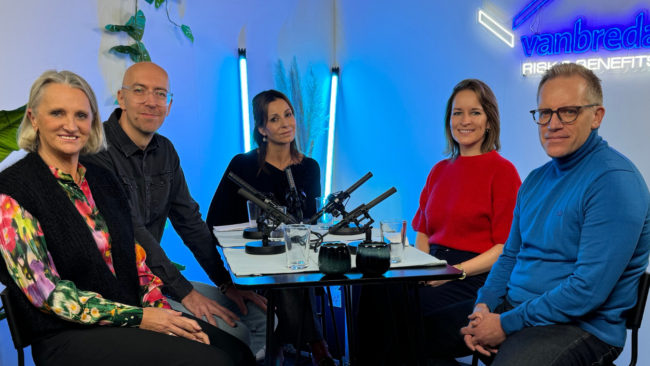The original recording of this videopodcast is available in Dutch.
Disability insurance can offer a solution for employers who want to invest in their employees’ well-being and support them with getting back to work. What’s more, it covers employees against loss of income. This is a must, as the contribution from the health insurance fund for employees during the first year of disability is limited to 60 percent of a capped annual salary. In addition, such insurance offers access to professional reintegration programmes, which can make a difference in getting employees back to work sooner.
Although legislation exists on reintegration programmes for those on long-term sick leave, the government doesn’t step in soon enough. Employers can only take the initiative from the fourth month of absence from work, yet research has shown that only half of people return to work of their own accord after three to six months of absence. It’s therefore better to take action sooner, for example from the fourth or fifth week of absence. Disability insurance can help employers here by providing better and faster access to reintegration programmes and addressing employees’ concerns.
Employers are taking an increasing interest in their employees’ well-being, and are keen to get them back to work in a positive frame of mind after a lengthy absence. In addition, reintegration programmes are becoming an increasingly important way for employers to stand out on the labour market with each passing year.
The proliferation of these programmes has various causes, including labour market shortages and government reforms that encourage employers to take responsibility for the reintegration of employees on long-term sick leave. Disability insurance including a reintegration programme is therefore no longer a luxury, but rather a necessity for companies that want to stand out.
When an employee is absent from work for a long period of time, the reintegration programme follows a set pattern:
- An external partner is asked to approach the employee and conduct an intake interview.
- During this interview, the employee’s willingness and motivation to start the reintegration programme is assessed.
- Participation in the programme is always voluntary.
- Although we do not have exact figures on how often employees enter the reintegration programme, most employees are willing to start it.
The programme starts with a conversation between the employee who is off sick and an external service provider. The employee’s work disability is examined in terms of its situation and phase and it is determined what support is needed, such as psychological support or physiotherapy.
If the evaluation of the initial interview is positive, the process continues with:
- an exploratory phase of guidance discussions to encourage a return to work
- a connecting phase in which contact is made with the employer and the occupational health service
- the creation of the right work context and the promotion of understanding on the part of the employee’s supervisor for any sensitivities the employee may have in order to make a successful return to work more likely.
The employee’s trust is important during reintegration. The process is voluntary and based on the employee’s consent. The employer is not involved right from the start, but only from the connecting phase. This allows the programme to be tailored to the employee’s individual needs, so that it can be as effective as possible in promoting a return to work.
Looking at the people who are absent from work for a long time, we find that:
- most of those who are absent for a long period are between 50 and 65 years old.
- however, the biggest increase in work disability is in the group between 29 and 39 years old.
- burnout and depression are becoming increasingly common as causes of absence from work.
As many as a quarter of young people who are unable to work are absent due to burnout or depression. This explains the growing emphasis being placed on psychological support during reintegration programmes. It’s also important for physical conditions such as cancer or chronic illnesses, of course.
Market figures show that 72 percent of people return to work after a reintegration programme. Without such a programme, only 50 percent resume work of their own accord after three to six months. After the first year of absence, this drops to 20 percent, and after two years, barely 10 percent return to work. The aim of a reintegration programme is to give people effective support in returning to work and it may lead to adapted work at the same employer or even retraining and outplacement with other employers.
Reintegration programmes are essential for both employers and employees in a competitive labour market. As well as helping retain valuable talent, they also contribute to the overall well-being and productivity of the workforce. With a growing number of people facing burnout and other mental health issues, it’s more important than ever for employers to prioritise reintegration efforts and provide wide-ranging support throughout the process.



